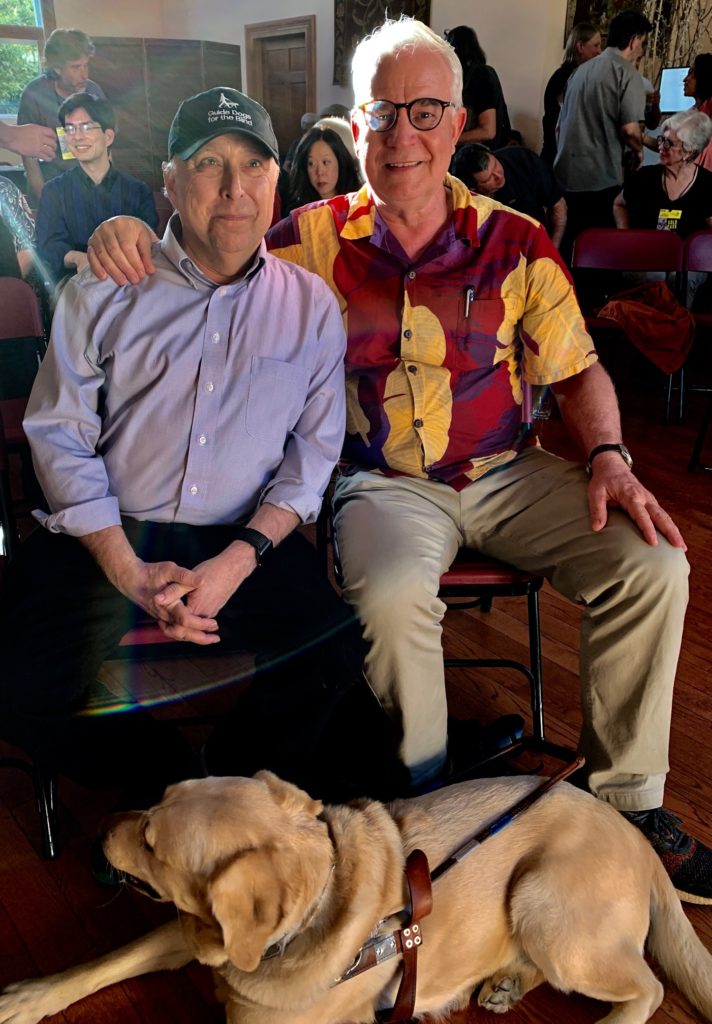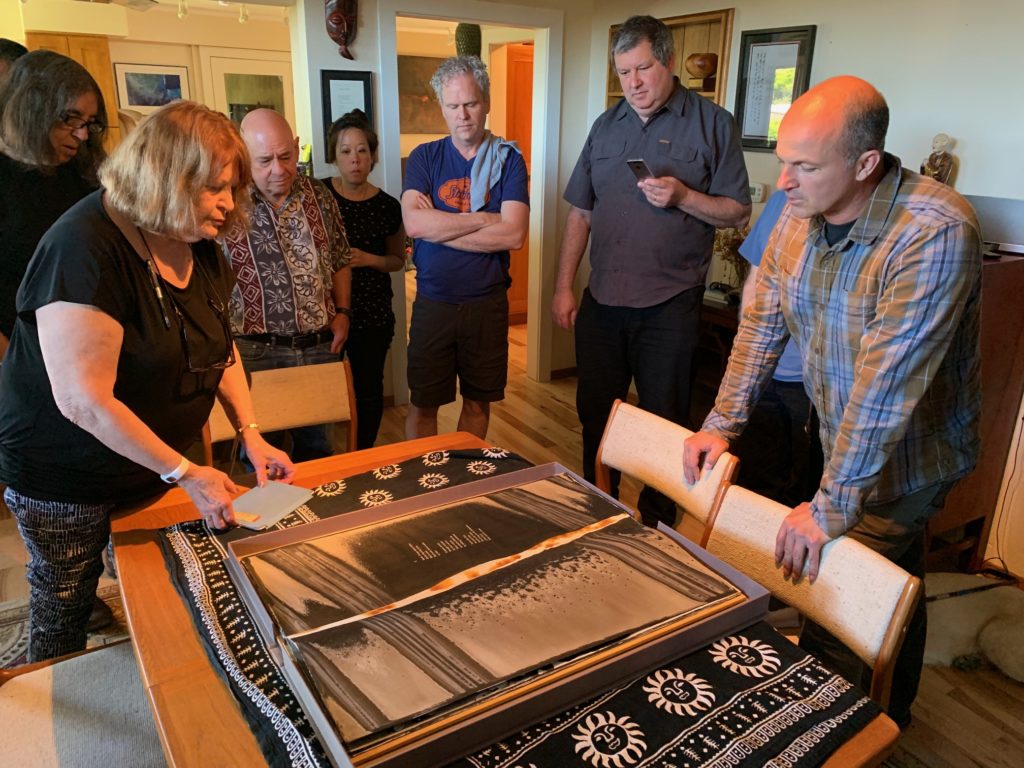CPF-Anacortes 2019 Schedule is here.
The Cascadia Poetry Festival is absolutely unique, offering both attention to local conditions (both social and geograpical/ecological), and to general matters of aesthetics (what poetry is up to right now–what matters to poets, and how are they responding to what matters). I know of few communities like this in the world – the other I am familiar with is in the UK: open, focused, exploratory, welcoming, democratic and engaged to its very core. The Cascadia Poetry Festival is a vital necessity.
– Stephen Collis
The Cascadia Poetry Festival, held in Anacortes, WA from May 9-12, was a wonderfully fulfilling experience for both participants and invited guests. The festival programs consisted of readings and discussion panels by well-known, accomplished poets and writers who were colleagues, collaborators and friends of the late poet Sam Hamill. The connection with Sam was in fact the theme of the festival, but the festival discourse, especially the panels, took on a life of its own and developed into a series of heartfelt discussions about Zen, the strength and frailties of the human spirit and the nature of one’s relationship with those whom we admire.
As someone who attended as both invited guest and workshop participant, I especially enjoyed the afternoon readings by the other festival participants. The attendees of the readings consisted of local poets, writers and students. Some of these folk were published, some not. Some of them read from memory and some from notes or the printed page. Some were experienced readers, others were not. But what connected them all was a heartfelt desire to translate their experience of the world into the medium of words to share with others.
And this got right to the heart of the matter.
Christopher Yohmei Blasdel Shakuhachi performer, writer Adjunct Lecturer, The University of Hawaii, Manoa

Steve Kuusisti, Christopher Yohmei Blasdel and Cate the Wonder Dog
Cascadia College Students Write about the Cascadia Poetry Festival-Anacortes, 2019:
One memorable idea from the festival came from Jason Wirth about the practice of Zen. He talked about how Zen is about radical honesty which was a very timely insight, seeing how honest and open the first panel was on Saturday morning.
The Walk in the Woods workshop I took kinda blew me away, I think just being outside made writing poetry very comfortable and familiar even though I generally don’t write poetry. We took a slow walk through the community forest of Anacortes, jotting down little observations as we went, it was a really neat sensory writing exercise. Everyone in my 9-person group wrote such beautiful and powerful poems to reflect something we all had experienced together, I loved that. After that workshop I feel compelled to go back outside to write, and it’s exciting because I have the desire to create something and I haven’t felt that in a while.
The most memorable thing for me was when I attended the poetry circle and one man, I forgot his name, read a poem while Christopher Yohmei played the shakuhachi (a bamboo Japanese flute). It was an absolutely beautiful performance! But just in general though, it was really nice to listen to everyone’s poems and to even share one of my own. I left the festival wondering about Sam Hamill. I heard a lot of people talk about him and mention him at the festival, and I read a little bit about him beforehand since it was sort of held in his honor. But I felt like I didn’t know enough about him to follow everyone’s conversations, so I’m interested to learn more about him and read some of his poetry and stuff. Overall I was really happy to have gotten to attend the festival 🙂
One memorable moment from the poetry festival was when Claudia Castro Luna talked about the pocket poetry that was started by a man (poet) who taught at a public school and there were little business type cards to take to remember and the poem from this 8th grade girl translated from Spanish to English was on it. It was my little souvenir and keepsake from the poetry festival. I would love to know more about Copper Canyon press and the details of Sam’s involvement. I have not read or heard much of Sam’s work so I would be curious to read more of his works to get to know more about him. The panel on Saturday morning gave the best culminating view on who Sam was and how he interacted with his students and colleagues. I got to share some of my poetry and it was very meaningful and after one of the sessions, one of the poets in the circle during the living room session named David came up to me afterward to encourage me to keep writing poetry. It was really sweet and such a good group of people to learn and share from.
One of the more memorable quotes I heard at the festival was from Claudia Castro-Luna who spoke to her simply existing (as a Spanish speaking person) in America was the most radical thing you can do right now.
One memorable idea from the festival was during Panel One where Dr. Jason Tetsuzen Wirth talks about the inspiration of writing today. I found it interesting that since the world war people have shifted their interests in writing because through the tough times people have found a reason to express their feeling and emotion through poems. A Question that came into mind during the 2nd panel was that, how can someone who doesn’t fully understand of the language to better understand the experience and emotion that the writer went through creating the poems. Do we need to understand the origin of the language to interpret the poem in a different perspective?
One memorable thing from the festival was when we got to be in a circle and everyone read their original poems. More specifically, when someone played the shakuhachi instrument along with someone reading a poem. I feel that the music definitely enhanced the poem, which made me really drawn to the whole entire piece. One thing I was still confused about during the panel discussing the translation of poems was when they talked about how Sam could translate poems of other languages (such as Chinese/Japanese) while barely even knowing the language itself.
After Saturday’s Living Room I ended up getting caught up in a conversation. The talkers consisted of me and two other women; Sandra and Julia. We spent nearly an hour just talking about the importance of writing throughout one’s life. All three of us fell into different generations and demographics but we quickly put to bed the superficialness of how it might seem like we’d have very little in common. Because the reality is we’re more alike than different….. I find this to be true for most humans. But really, it was just so enjoyable to laugh and find comfort in the ability to write for one’s self. To prove nothing to no one but giving in to the want of expressing your feelings about the world around you to yourself. How empowering pen and paper can be in a world that at times can seem like it’s trying to silence us all slowly. Impressively Sandra had released a book this year, Boats for Women. Over the past week I’ve found such joy in reading her words long after our conversation ended. It felt like a gift that kept on giving. And as it now resides in its new home on my library shelf. I get peace over knowing that for me; poetry, Sandra’s book, and the many conversations I hope to have in the future are all gifts I’ve been given and hope to give to others as times keeps going.
Cascadia Poetry Festival: Cascadia Testimonial
It was my great pleasure to participate in the Cascadia Poetry Festival, May 9–12, in Anacortes, WA, as the experience was positively unique among my many experiences of poetry conferences and festivals. A tribute to the poet, translator, essayist, editor and publisher Sam Hamill, the festival underscored Hamill’s lifetime of bringing together poets, writers, musicians, artists, and appreciators from diverse walks of life to share, collaborate, and transform individual experiences and energies into multiple projects, fresh understandings, and emerging ideas. The spirit of community coursed through every day and evening, each reading and panel; it was expressed most directly during the “living room” readings, which brought together festival participants, attendees, and residents of the local community—anyone who wished to share a poem, play a piece of music, or tell a story. This sense of inclusion may have been the most unique aspect of the festival, openness to the many ways of seeing and being that generate positive relationships, even as the organizers’ well-crafted guidelines kept the quality of the experience deeply satisfying for all who contributed work or simply listened. Topics central to the composing of poems and poems in translation, the diverse practices of Zen Buddhism and the art of being present, the enduring work of environmental stewardship and sustainability, and the human-to-human and human-to-nature relationships that make creative solutions possible—all were given breath and space. My work and I, on a personal level, will benefit from the experience for a long time to come.
William O’Daly
May 28, 2019

Ian Boyden showing the book he created for Sam Hamill, Habitation.

Poets gather in the Living Room to share their own work. (Photo by Lauren Grosskopf) Croatian Cultural Cener, Anacortes, WA
